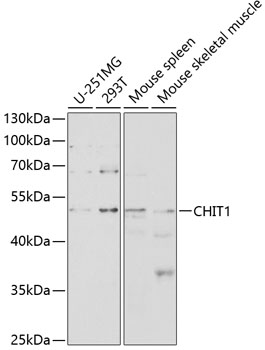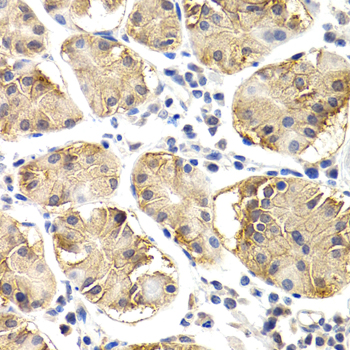Metabolism Antibodies 2
Anti-CHIT1 Antibody (CAB2015)
- SKU:
- CAB2015
- Product Type:
- Antibody
- Reactivity:
- Human
- Reactivity:
- Mouse
- Host Species:
- Rabbit
- Isotype:
- IgG
- Research Area:
- Metabolism
Description
| Antibody Name: | Anti-CHIT1 Antibody |
| Antibody SKU: | CAB2015 |
| Antibody Size: | 20uL, 50uL, 100uL |
| Application: | WB IHC |
| Reactivity: | Human, Mouse |
| Host Species: | Rabbit |
| Immunogen: | Recombinant fusion protein containing a sequence corresponding to amino acids 217-466 of human CHIT1 (NP_003456.1). |
| Application: | WB IHC |
| Recommended Dilution: | WB 1:500 - 1:2000 IHC 1:50 - 1:200 |
| Reactivity: | Human, Mouse |
| Positive Samples: | U-251MG, 293T, Mouse spleen, Mouse skeletal muscle |
| Immunogen: | Recombinant fusion protein containing a sequence corresponding to amino acids 217-466 of human CHIT1 (NP_003456.1). |
| Purification Method: | Affinity purification |
| Storage Buffer: | Store at -20'C. Avoid freeze / thaw cycles. Buffer: PBS with 0.02% sodium azide, 50% glycerol, pH7.3. |
| Isotype: | IgG |
| Sequence: | SWEK VTGH NSPL YKRQ EESG AAAS LNVD AAVQ QWLQ KGTP ASKL ILGM PTYG RSFT LASS SDTR VGAP ATGS GTPG PFTK EGGM LAYY EVCS WKGA TKQR IQDQ KVPY IFRD NQWV GFDD VESF KTKV SYLK QKGL GGAM VWAL DLDD FAGF SCNQ GRYP LIQT LRQE LSLP YLPS GTPE LEVP KPGQ PSEP EHGP SPGQ DTFC QGKA DGLY PNPR ERSS FYSC AAGR LFQQ SCPT GLVF SNSC KCCT WN |
| Gene ID: | 1118 |
| Uniprot: | Q13231 |
| Cellular Location: | Lysosome, Secreted |
| Calculated MW: | 43kDa/48kDa/49kDa/51kDa |
| Observed MW: | 52kDa |
| Synonyms: | CHIT1, CHI3, CHIT, CHITD |
| Background: | Chitotriosidase is secreted by activated human macrophages and is markedly elevated in plasma of Gaucher disease patients. The expression of chitotriosidase occurs only at a late stage of differentiation of monocytes to activated macrophages in culture. Human macrophages can synthesize a functional chitotriosidase, a highly conserved enzyme with a strongly regulated expression. This enzyme may play a role in the degradation of chitin-containing pathogens. Several alternatively spliced transcript variants have been described for this gene. |
| UniProt Protein Function: | CHIT1: Degrades chitin, chitotriose and chitobiose. May participate in the defense against nematodes and other pathogens. Isoform 3 has no enzymatic activity. Belongs to the glycosyl hydrolase 18 family. Chitinase class II subfamily. 3 isoforms of the human protein are produced by alternative splicing. |
| UniProt Protein Details: | Protein type:Secreted; Hydrolase; Carbohydrate Metabolism - amino sugar and nucleotide sugar; EC 3.2.1.14; Secreted, signal peptide Chromosomal Location of Human Ortholog: 1q32.1 Cellular Component: extracellular space; lysosome Molecular Function:endochitinase activity; chitin binding; chitinase activity Biological Process: polysaccharide catabolic process; response to bacterium; immune response; chitin catabolic process Disease: Chitotriosidase Deficiency |
| NCBI Summary: | Chitotriosidase is secreted by activated human macrophages and is markedly elevated in plasma of Gaucher disease patients. The expression of chitotriosidase occurs only at a late stage of differentiation of monocytes to activated macrophages in culture. Human macrophages can synthesize a functional chitotriosidase, a highly conserved enzyme with a strongly regulated expression. This enzyme may play a role in the degradation of chitin-containing pathogens. Several alternatively spliced transcript variants have been described for this gene. [provided by RefSeq, Jan 2012] |
| UniProt Code: | Q13231 |
| NCBI GenInfo Identifier: | 37999493 |
| NCBI Gene ID: | 1118 |
| NCBI Accession: | Q13231.1 |
| UniProt Related Accession: | Q13231 |
| Molecular Weight: | |
| NCBI Full Name: | Chitotriosidase-1 |
| NCBI Synonym Full Names: | chitinase 1 |
| NCBI Official Symbol: | CHIT1 |
| NCBI Official Synonym Symbols: | CHI3; CHIT; CHITD |
| NCBI Protein Information: | chitotriosidase-1 |
| UniProt Protein Name: | Chitotriosidase-1 |
| UniProt Synonym Protein Names: | Chitinase-1 |
| Protein Family: | Chitotriosidase |
| UniProt Gene Name: | CHIT1 |
| UniProt Entry Name: | CHIT1_HUMAN |
View AllClose








